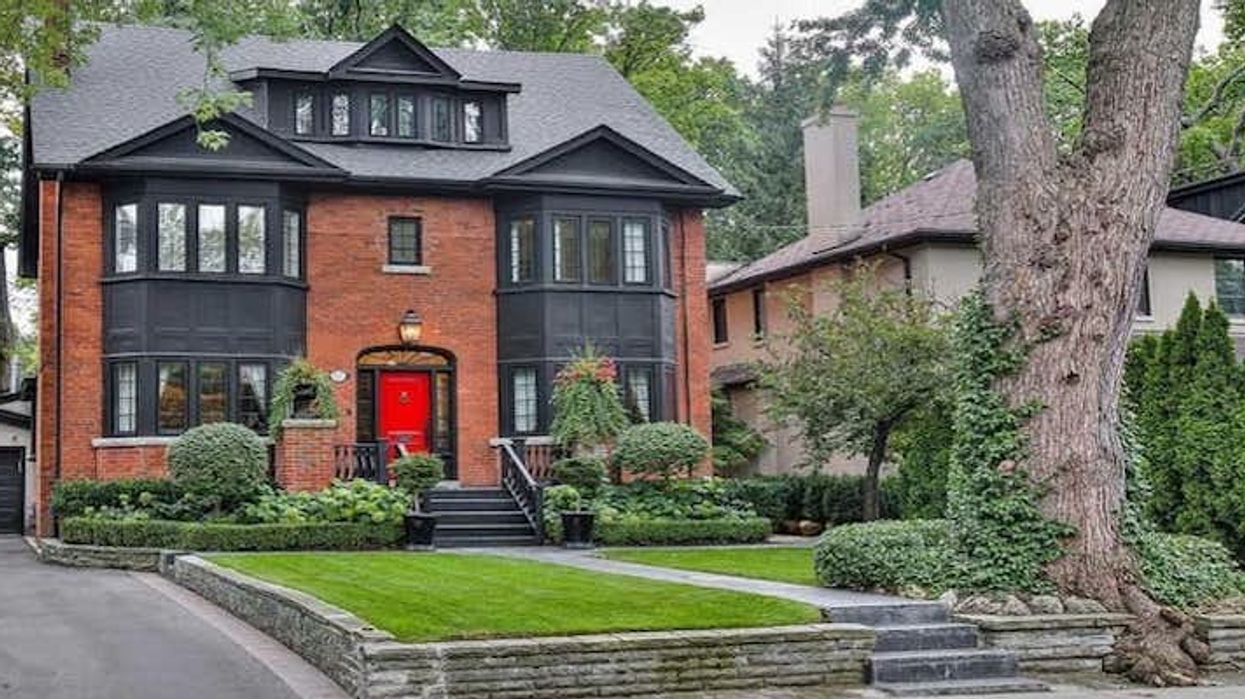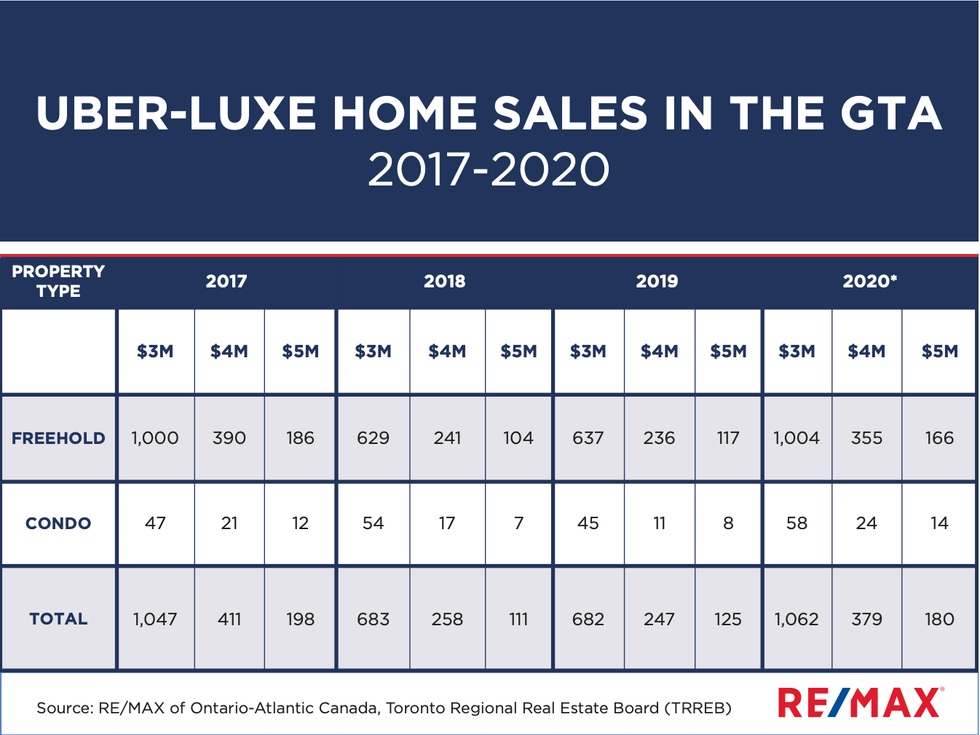After a historically slow spring season, homebuyers returned to markets across the Greater Toronto Area (GTA) in droves during the post-lockdown period, even within the luxury home sector.
Thanks to a "sharp" economic rebound in the third quarter and historically low-interest rates, the GTA’s luxury segment -- defined as homes over $3 million -- set new records amid the pandemic, with the number of freehold and condominium properties sold in 2020 topping peak 2017 levels, according to a report from RE/MAX of Ontario-Atlantic Canada.
The international real estate company says that more than 1,000 properties over the $3 million mark changed hands last year -- up 55.7% from 2019 (1,062 versus 682) while edging up 1% ahead of the previous record set in 2017 (1,062 versus 1,047).
What's more, the number of homes sold over $4 million climbed 53.4% year-to-date (379 versus 247), while sales over $5 million appreciated 44% to 180 in the GTA, up from 125 in 2019.
READ: Listed: 15 of Our Favourite Properties to Hit the Toronto Real Estate Market in 2020
Christopher Alexander, Chief Strategy Officer and Executive Vice President, RE/MAX of Ontario-Atlantic Canada says the housing bounce-back -- during one of the most tumultuous periods in recent history -- has been "nothing short of remarkable.”
“A combination of both economic and psychological drivers contributed to a robust upswing in demand, influencing one of the greatest pivots in Greater Toronto housing market history.”
While Toronto is known for its luxury homes and condos, freehold sales over $3 million surged outside of Canada's largest city in 2020, partially due to economic stimulus which played a "definitive role" in the uptick in home buying activity.
But the true catalyst of the robust activity was the COVID-19 lockdown, as homebuyers prioritized personal space and having the ability to work from home, which RE/MAX says pushed them to buy larger homes in less densely populated neighbourhoods, with some choosing to relocate entirely out of the 416 to the 905 and beyond.
According to RE/MAX, freehold sales over $3 million surged outside of the 416 area code in 2020, with Halton reporting a 188.8% increase in sales (130 versus 45), followed by Peel at 112% (89 versus 42), and York at 85.5% (180 versus 97) in 2020.
Alexander says a similar pattern played out in major urban centres in the US such as New York City and San Francisco where the pandemic has tipped the scales in favour of a more suburban lifestyle.
“And while demand is still strong in the 416, where luxury freehold sales represent 59% of total sales, performance in suburban areas, especially those north and west of the city, is particularly noteworthy," said Alexander. "Sales in the 905 bolstered overall luxury sales in 2020, leading to a record-breaking year for the uber-luxe segment of the Greater Toronto real estate market.”
However, luxury freehold properties weren't alone in their upward momentum. RE/MAX of Ontario-Atlantic Canada found luxury condominiums in the GTA "bucked" the downward trend for condominiums sales overall in 2020, with a 28.8% rise in year-over-year sales at $3 million-plus (58 versus 45). What's more, the number of condominium apartments and townhomes that have changed hands at the $3 million, $4 million, and $5 million price points have all set new records.
“Domestic buyers were out in full-force in the GTA housing market in 2020, offsetting a decline in international home-buying activity,” explains Alexander. “With this segment largely absent throughout much of the year, the overall strength of the market, in what was essentially nine months of activity, was pretty incredible.”
As for what's to come, Alexander says the rollout of the COVID-19 vaccine "hopefully marks the beginning of the end of the pandemic," and will set the stage for a return to normalcy -- though it won't happen overnight.
"The second lockdown may hamper home-buying activity to some extent in the first quarter of 2021, but the market is expected to take flight in the spring as numbers improve and the vaccine rolls out across the country.”
RELATED: Toronto’s Luxury Real Estate Market Remains ‘Resilient’ Amid Pandemic
What's more, as borders re-open worldwide, Alexander says immigration will weigh heavily on local housing markets as the federal government shifts its attention to economic growth.
This fall, Canada’s Immigration Minister, Marco Mendicino, unveiled a three-year immigration plan that sets ambitious targets for bringing skilled workers, family members, and refugees into Canada.
Mendicino said the country will welcome more than 1.2 million new immigrants over the next three years, with up to 401,000 new permanent residents in 2021 -- with nearly half projected to settle in Ontario.
Alexander noted that economic fundamentals are also predicted to improve significantly in 2021, with GDP growth forecast to climb 4.5% in the province.
While the uber-luxe segment of the GTA market represents only a small fraction of total residential sales, Alexander says the activity at the top end bodes well for the market overall in 2021.






















